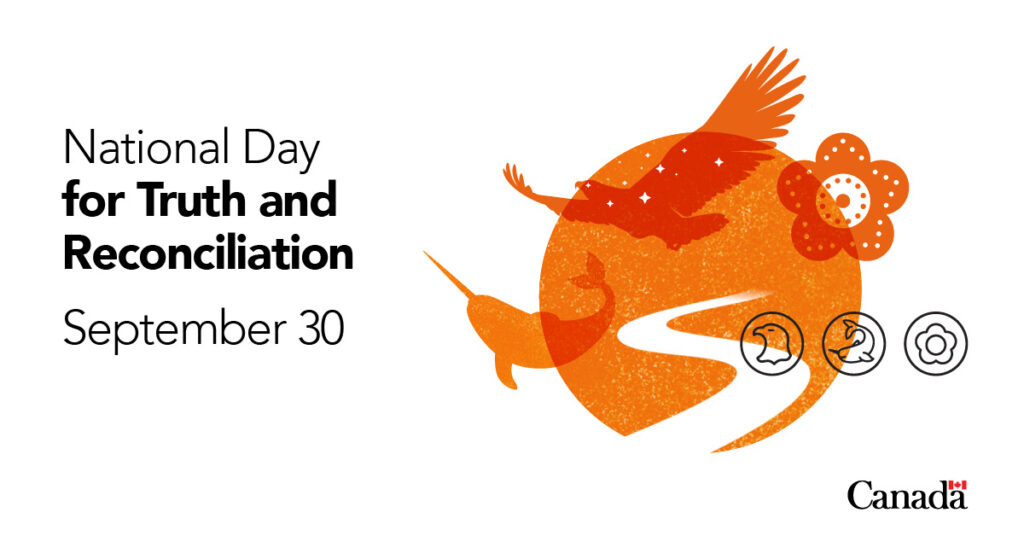On this National Day for Truth and Reconciliation 2025, we stand in solidarity with Indigenous communities across Canada. Today, we honor the survivors of residential schools and remember those who never returned home. It is a day to reflect on the lasting impacts of colonialism and a reminder of the importance of facing the truths of our shared history.
But reflection is only the beginning. As we look to the future, we are committed to hope, healing, and action. Together, we can foster understanding and build supportive environments for individuals and families and communities affected by Fetal Alcohol Spectrum Disorder (FASD). Today, we celebrate Indigenous communities and reaffirm our commitment to reconciliation and justice.
In this post, adapted from the CanFASD Annual Impact Report 2024–2025, we share how we are working to create a National FASD Indigenous Framework in Canada – an initiative aimed at combining Indigenous knowledge with culturally responsive FASD supports.
What is the Framework?
Western health care has generally failed to incorporate Indigenous knowledge and culture, which is a missed opportunity to holistically balance physical, emotional, mental, and spiritual health. Unique etiological factors, rooted in historical and ongoing colonization, deeply impact FASD prevalence and management for Indigenous children and families. As such, there is a need for a culturally sensitive, community-driven approach to FASD assessment, diagnosis, and support: a national FASD Indigenous framework in Canada.
Drawing inspiration from the recently developed Australian FASD Indigenous Framework, the purpose of this community-based participatory research project is to co-create a strengths-based framework for FASD assessment, diagnosis, and support that is grounded in Indigenous knowledges and cultures. Partners from the University of Alberta and CanFASD, together with additional community partners, are establishing a community advisory circle, conducting a realist literature review, surveying FASD clinics across Canada, and conducting sharing sessions with clinicians and people with lived experience.
Progress through Partnership
This project began with a $200,000 grant from the One Child Every Child initiative through the University of Calgary. Over the past year, investigators have done a lot to raise awareness of the project, including meeting with government representatives, presenting to community members in the Yukon, and presenting at events like the 2025 International Meeting on Indigenous Child Health. Recently, the Yukon Government committed matching funds to ensure Yukon First Nation voices are integrated into the framework.
In addition to raising awareness about the project, we have taken steps towards research and data collection. We are in the process of searching for and screening relevant articles for a realist review of the literature. Our team has also received approval from the University of Alberta Research Human Ethics Board to begin collecting data for this project.
Our next step is to convene a meeting of our Community Advisory Committee to obtain guidance on moving forward with our realist review. We will also begin surveying clinics across Canada to understand service provider perspectives on providing culturally safe services to Indigenous children and families. In addition, we are in the process of hiring a Research Assistant in the Yukon to establish a local presence for the project in the Territory.
Emerging Insights and Key Reflections
Our knowledge mobilization efforts and conversations about this project have shed light on several tensions that remind us of the need to move with intention and sensitivity. For example, although our framework is intended to be national, we intend to avoid pan-Indigenization. We are aiming to balance recognition that Indigenous worldviews and ways of knowing are rooted in their individual contexts, histories, locations and experiences with acknowledgment of potential synchronies and opportunities for co-learning and collaboration across geographical and cultural distinctions. In addition, we aim to resist contributing to the inaccurate and harmful conception of FASD as an “Indigenous issue.” It is our intent that the process of navigating these tensions will allow for co-creating actionable conversations and learnings to address the layered racism and colonialism that undergird the health care experiences of many Indigenous peoples.
Further resources
On this National Day for Truth and Reconciliation, take time to learn, listen, and reflect. Some useful resources include:
- Free course to counter anti-Indigenous racism in healthcare
- National Centre for Truth and Reconciliation
- CanFASD Indigenous Resources
- Celebrating Indigenous-led FASD initiatives in Canada blog post
For a deeper dive into Truth and Reconciliation and Indigenous approaches to FASD, join us at the Canada FASD Conference. Featured presentations include:
- Manitoba’s FASD Strategy Indigenous Elders Circle
- Qanuqtuurniq: Innovative FASD Services in Nunavut
- Healing through Understanding: Supporting Indigenous Families Impacted by FASD
These sessions provide valuable opportunities to reflect on reconciliation in action and to expand your understanding of holistic, inclusive approaches to FASD.
